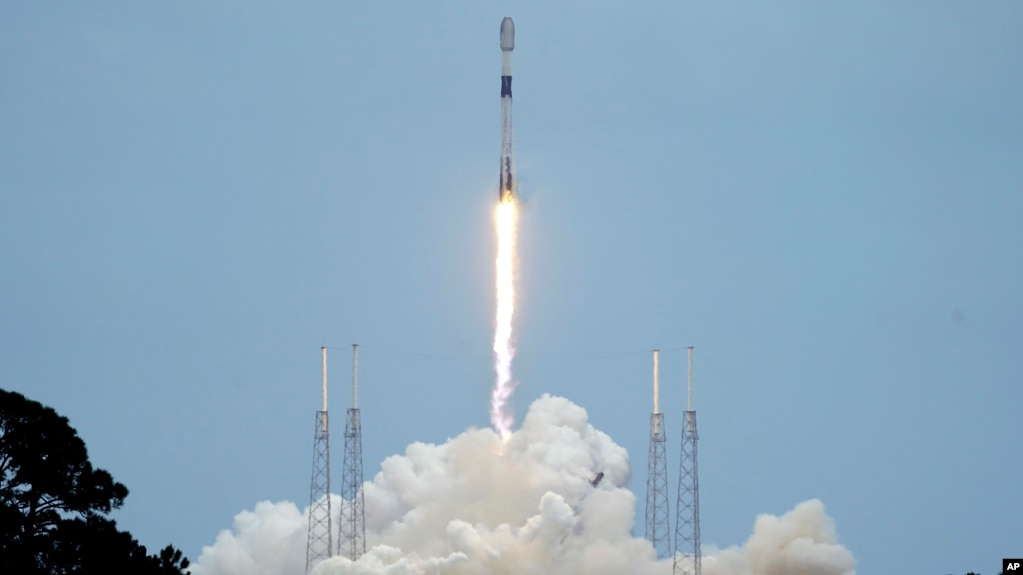Elon Musk Seeks to Bring Starlink Internet
Service to Iran

SpaceX chief Elon Musk says he will seek to bring his Starlink satellite internet service to Iran. The billionaire businessman suggested his plans in a message on Twitter.
Earlier this week, Musk announced on the social media service: “Starlink is now active on all continents, including Antarctica.”
After reading Musk’s tweet, Iranian-born science reporter Erfan Kasraie then posted his own message to the SpaceX chief.
“I'm sure you won't answer it Mr Musk, but is it technically possible to provide Starlink to Iranian people?” Kasraie asked. “It could be a game changer for the future.”
Musk did answer Kasraie. He wrote, “Starlink will ask for an exemption to Iranian sanctions in this regard.” The sanctions he commented about are linked to Iran’s nuclear activities. The restrictions bar a wide range of U.S. companies from doing business with Iran.
SpaceX owns and operates Starlink, a network of satellites launched into near-Earth orbit. Since the network is satellite-based, it is designed to provide high-speed internet service to rural and under-connected areas of the world.
SpaceX says the service aims to produce internet speeds up to 300 megabits per second (Mbps) to all areas of the world. In the United States, the service costs $110 a month, with a one-time cost of $599 for equipment. The service costs less in some other parts of the world.
So far, more than 3,000 Starlink satellites have been deployed to space. SpaceX launched the latest set of 54 satellites on Sunday. In a video released on social media in June, the company said the Starlink service had nearly 500,000 users in 32 countries.
Several people asked Musk on Twitter to provide the satellite-based internet service in Iran.
Musk’s suggestion that he will seek an exemption to offer the service in Iran came as widespread protests took place in the country’s Kurdistan province. The area is home to Iran’s Kurdish minority.

A newspaper with a cover picture of Mahsa Amini, a woman who died after being arrested by Iranian morality police is seen in Tehran, Iran, Sept. 18, 2022. (West Asia News Agency via Reuters)
The demonstrations were held to protest the death earlier this month of a 22-year-old woman who died while in police detention. The woman, Mahsa Amini, was arrested by officers of Iran’s “morality police.”
The United Nations human rights office condemned Amini’s death and called for an investigation. The U.N. body says the country’s morality officers have expanded their activities in recent months. They have targeted women for not correctly wearing the Islamic head covering known as a hijab.
Iranian police have denied mistreating Amini and said she died of a heart attack. Iranian officials have said they are investigating the incident.
In Iran, access to social media and some media content is severely restricted. In recent days, the internet watch group NetBlocks reported a "near-total" disruption to internet connectivity in the capital of Iran’s Kurdish area, where the protests took place.

A Ukrainian soldier shoots close to Izium, Kharkiv region, Ukraine, Tuesday, Sept. 13, 2022. (AP Photo/Kostiantyn Liberov)
Shortly after Russia invaded Ukraine, Elon Musk announced that the Starlink service had been established in Ukraine. His announcement came after the NetBlocks group said it had confirmed major disruptions to internet service across Ukraine after the start of the invasion.
SpaceX said recently it had deployed more than 15,000 Starlink receivers to Ukraine. Musk said earlier this year that Russian forces had not been able to disrupt the Starlink service.
In April, the U.S. Agency for International Development (USAID) announced it had helped provide 5,000 Starlink receivers to Ukraine through a “public-private partnership” with SpaceX.
USAID explained the Starlink system deployment in a statement. It said the receivers aimed to permit “public officials and critical citizen service providers to continue to communicate within Ukraine and with the outside world” when other communication services were disrupted.
Words in This Story
exemption – n. special permission not to have to do something or pay something
sanction – n. an action taken to force a country to obey international laws by limiting trade or aid to the country
access – n. the ability to find or see something
disrupt – v. to interfere with a normal activity
https://learningenglish.voanews.com/a/elon-musk-seeks-to-bring-starlink-internet-service-to-iran/6757143.html


